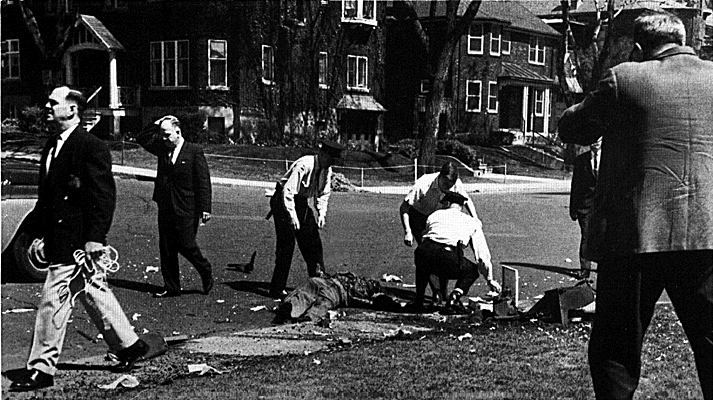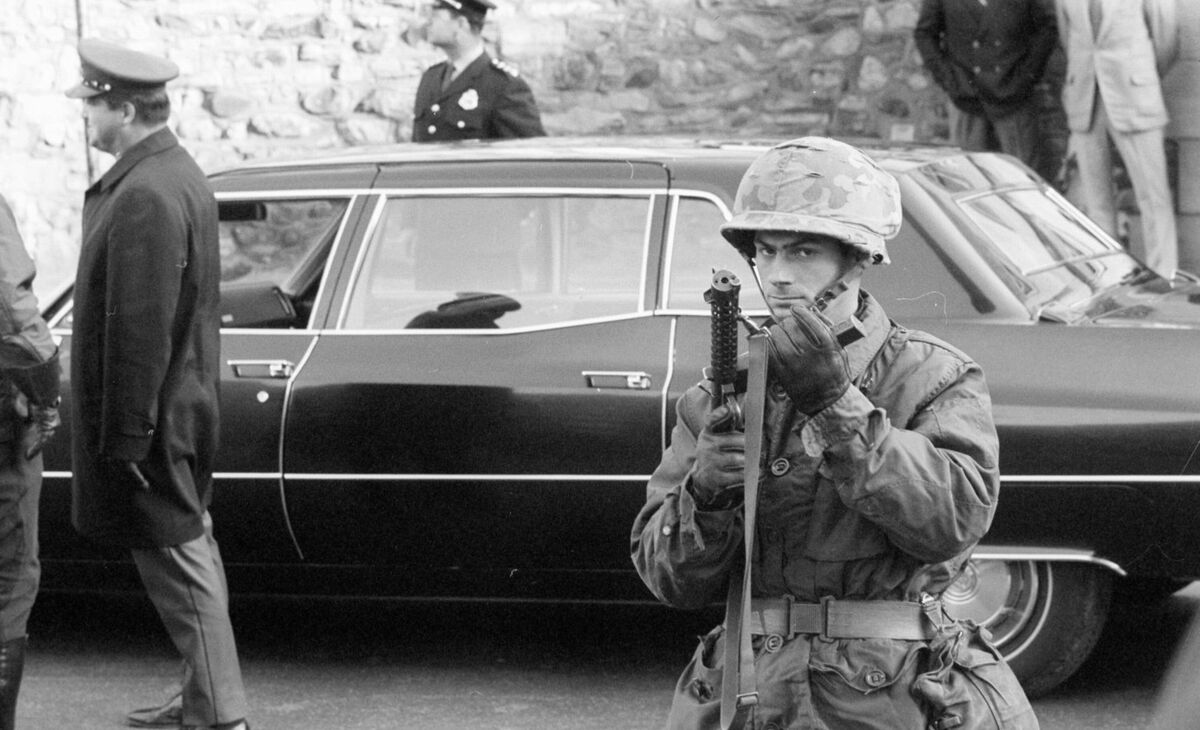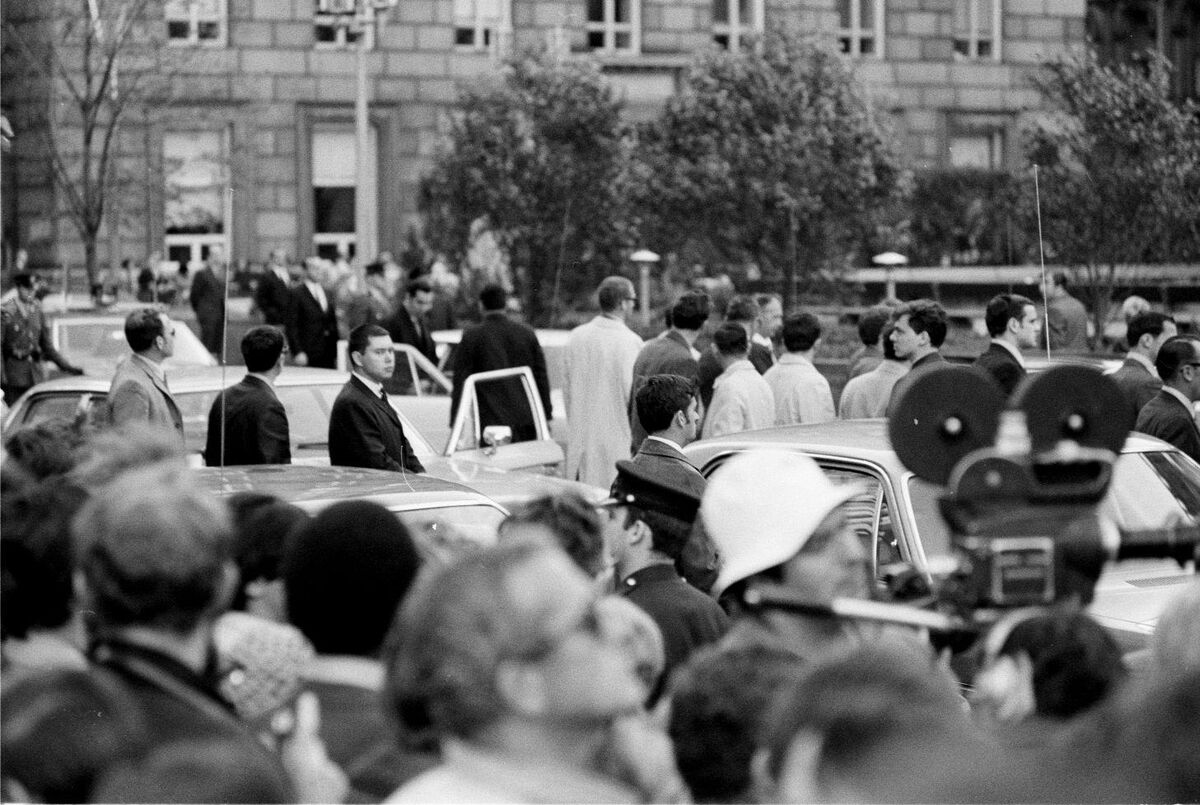The Quiet Revolution questioned Quebec’s place within Canada. Some nationalist groups felt that Quebec’s culture and ideologies were very different from the rest of the country, setting the province apart. These ideas then led the way to discussions on the Constitution of Canada. Some groups advocated for Canadian unity, while others argued for the province’s independence.
While some nationalist groups promoted peaceful action, others were more vocal and used violence to make their point. Among them were the Front de libération du Québec (FLQ). FLQ members—or felquistes—denounced the Anglophone domination in Quebec and advocated for an independent Quebec. Some more extremist FLQ members were responsible for the events that led to the 1970 October Crisis, using acts of terrorism to make their point.
In 1963, the FLQ began planting bombs in various locations throughout Quebec. Their aim was to denounce those who opposed Quebec’s independence. The bombings continued until 1966 and targeted buildings of institutions that the FLQ felt were oppressing Quebecers. For example, they targeted the post office because it was a symbol of the British Crown. They also targeted privileged Anglophone neighbourhoods in Montreal, such as Westmount.

In April 1963, a security guard was killed after the FLQ set off a bomb at the Canadian Army Recruiting Centre. Following this event, 23 FLQ members were arrested. In response to these arrests and in order to continue their violent actions, the FLQ reorganized and added new factions. The Armée de libération du Québec joined the FLQ in 1963 and the Armée révolutionnaire du Québec joined in 1964. These two armed groups supplied the FLQ with weapons and money, often obtained through armed robbery. Intense clashes between the FLQ and the police became more frequent.
The FLQ became more radical in 1966 and had closer ties with American revolutionaries in a time where opposition to the Vietnam war was growing and social movements seeking social justice were gaining ground. FLQ members argued over what to do and how to do it—some wanted to reorganize the group and develop new strategies, while others wanted to take further action and remove politicians from office.
On October 5, 1970, the Libération faction of the FLQ kidnapped the British diplomat James Richard Cross. In exchange for his release, the FLQ’s list of demands included:
-
freeing the 23 FLQ members arrested after the security guard’s death in 1963
-
their paid safe passage to Cuba or Algeria
-
a $500,000 ransom
Not all of the kidnappers’ demands were granted, but in exchange for Cross’ safe return, they were given safe passage to Cuba to escape justice. On October 8, 1970, the FLQ broadcast its manifesto on Quebec’s independence.
On October 10, 1970, the Chénier Cell–a Montreal-based group of the FLQ – kidnapped Quebec Labour and Immigration Minister Pierre Laporte, sparking the beginning of the October Crisis.
The police intervened and tried to restore order on October 15, 1970. On October 16, 1970, Trudeau’s federal government invoked the War Measures Act at Robert Bourassa’s request. This Act allowed authorities to arrest 500 people without a warrant, including artists, nationalists, trade unionists and intellectuals. Armed soldiers were sent to certain cities to crack down on protests. This Act remained in force until April 1971.
The War Measures Act suspended people’s fundamental rights and privileges and gave the army and the police full powers. They were authorized to arrest and detain people without charges or a trial. The media was also censored to limit communication and riots in order to control the people as much as possible to avoid violent protests, enabling the federal government to maintain order in the country.
This Act has been invoked three times in Canadian history: during World War I, World War II and the 1970 October Crisis. It has since been replaced by the Emergency Measures Act.

On October 17, 1970, Pierre Laporte died under mysterious circumstances while being held by the FLQ. The FLQ argued that his death was accidental, but their opponents had doubts. The FLQ immediately lost public support following Laporte’s death and the army with law enforcement put an end to the October Crisis.

On December 3, 1970, James Richard Cross was released. On December 28, 1970, FLQ member Paul Rose was arrested in connection with Pierre Laporte’s death. The FLQ remained active until 1972, but had lost public support and gradually faded away until it was eventually dissolved. Support for an independent Quebec remains strong, but its supporters now champion peaceful and democratic approaches to sovereignty.
Following the arrest of FLQ activists Charles Gagnon and Pierre Vallières in 1968, a cultural resistance movement was born. This movement gave rise to the show Chants et poèmes de la résistance, for which poet Michèle Lalonde wrote the poem Speak White, inspired by the insult Anglophone Canadians used to shame Francophone Canadians.